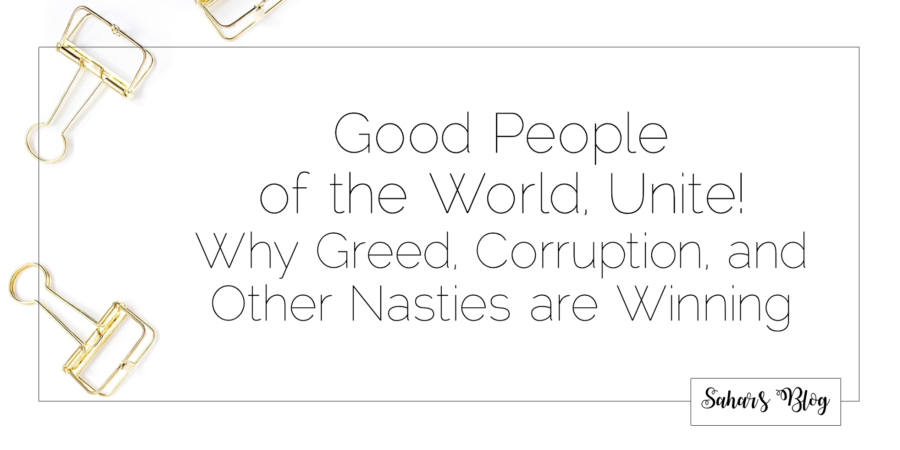In the face of all the bad news we have been getting lately, let’s get this out there, again and again: good people are the rule, not the exception. Which begs the question: why is the world so bad?
I think it’s because good people are not organized and united.
Strength in Unity
Bad people connive and plan together. In other words, they are united. For example, corporations are united in the way they influence policy and take advantage of everything they can to become richer and richer. Their greed unites them.
So, what about good people? We can be united, but it seems that it’s only when something extremely bad happens do we arise as one and face it. But in our day-to-day lives, we don’t seem to be able to agree on how to take down some of the negative forces in society, however obviously they may be.
Staying the Course in Calm Waters
How can we, then, learn to be united when there isn’t an obvious “big bad” to beat? How can we contribute to make the world a better place when it’s not in crisis? How can we inform our day-to-day actions so that they reflect our goodness, rather than support, for all intents and purposes, evil?
We need to continue conversations that are sparked in times of crisis. We need to address racism not only in soundbites and emotional outbursts when someone dies, but before this happens in the first place. We need to be involved in governance issues before corruption robs us of our rights. We need to defend the rights of minorities before horrific things happen to them. We need to take care of our planet before it falls apart.
Realising the Power We Have
The other challenge is to realise that we are more powerful than we know. When I tell people that I am boycotting Nestlé, most tend to tell me that they don’t think my boycott will do much, if not anything. But I know that a number of people around me have started boycotting Nestlé as well. They have also started thinking about where they place their money as consumers in general, and choosing to support smaller and more ethical businesses. Things are, indeed, changing, with relatively small actions.
Here are some examples of the “little” things we can do that will bring about major change, should we good people choose to unite:
Helping the Environment
How green are you? How much do you buy? How much do you waste? Where can you cut?
We can’t all overhaul our entire lives and become carbon-neutral. I, for one, can’t afford to build a house in such a way that living won’t leave any trace on the environment. But I take all the little steps that I can take. Switching from plastic garbage bags to decomposable ones; reducing consumption as much as possible; using public transportation as much as possible; reducing consumption of meat; buying local; using even just one reusable diaper a day; using reusable coffee cups; recycling every bit of metal, plastic, and paper that we can – all of these add up!
Ending Racism
What are your prejudices? Are you addressing them? Are you reading about The Other? Are you talking to The Other? Are you purging racist media and conversation from your life? Are you supporting racism through your life choices?
Racism is a corrosive element of our society that we have to address. It’s a big problem, but if we chip at it, one bit at a time, it can come tumbling down – certainly faster than if we sit doing nothing, right?
Stopping Sexism
Are you doing, either as a man or woman, what you are doing because you want to or because you think you need to? Are you exercising to be manly or to be healthy? Are you exercising to be stick-thin or to be healthy? Men, why are you not wearing a dress or makeup or heels – because you don’t want to, or because you are told not to?
Final Thoughts
Just like drops of water that come together and form a bigger and bigger body of water, good people have to do the same. But it is only when us good people start systematically addressing underlying issues that trouble our world that we will be able to find each other and form a body of water big enough to effect change.
We also have to realise that our little actions are not that little, after all. The list above might not seem like anything world-shaking. But just take a second to imagine what we would be able to achieve if only half of the people in the world tried to systematically address them.
The possibilities really are endless.

